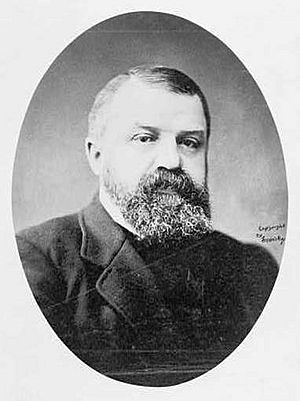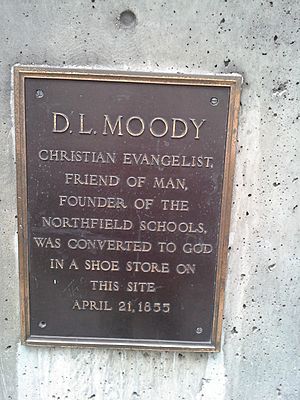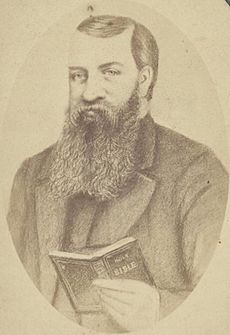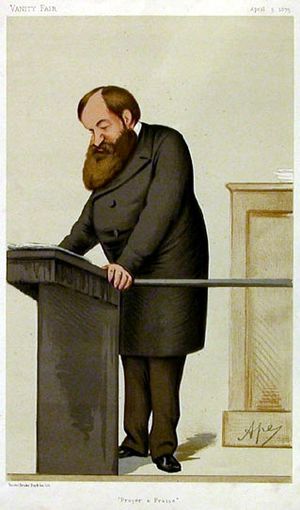Dwight L. Moody facts for kids
Dwight Lyman Moody (born February 5, 1837 – died December 26, 1899) was an important American speaker and publisher. He was known as D. L. Moody. He started many famous places like the Moody Church, the Northfield Mount Hermon School, and the Moody Bible Institute.
One of his most famous sayings was: "Faith makes all things possible... Love makes all things easy." Moody left his successful shoe business to spend his life helping others. He worked with soldiers during the Civil War through the YMCA. In Chicago, he built a major center for his work that is still active today. He traveled widely with singer Ira Sankey, speaking to huge crowds with his powerful style.
Contents
Dwight Moody's Early Life
Dwight Moody was born in Northfield, Massachusetts. He was the seventh child in a big family. His father, Edwin J. Moody, was a farmer and stonemason. His mother was Betsey Moody. Dwight's father died when Dwight was only four years old. His mother had to work very hard to take care of nine children.
Sometimes, Dwight was sent to work for food and a place to stay. He complained about the simple meals, but his mother made him go back when she learned he was getting enough to eat. His mother always made sure the children went to church. Dwight and his eight brothers and sisters grew up in the Unitarian church.
When Moody was 17, he moved to Boston. He found a job at his uncle's shoe store. His uncle asked him to go to the Congregational Church of Mount Vernon. In April 1855, something important happened. His Sunday school teacher, Edward Kimball, talked to him about God's love. This talk changed Moody's life and started his journey as a speaker. He joined the church in May 1856.
Dwight Moody's Work During the Civil War
During the American Civil War, D. L. Moody chose not to join the army. He later said he was like a Quaker, who believes in peace. Instead, he worked with the United States Christian Commission of YMCA. This group helped Union soldiers during the war.
Moody visited battlefields nine times. He was with soldiers after big battles like the Battle of Shiloh. He also entered Richmond, Virginia, with General Grant's troops.
On August 28, 1862, Moody married Emma C. Revell. They had three children: a daughter named Emma Reynolds Moody, and two sons, William Revell Moody and Paul Dwight Moody.
Building a Legacy in Chicago
In 1858, Moody started a Sunday school in Chicago. It grew very quickly. The Sunday school needed a permanent place, so Moody started a church in Chicago in 1864. It was called the Illinois Street Church, which is now known as the Moody Church.
In June 1871, Dwight Moody met Ira D. Sankey at a meeting in Indianapolis. Sankey was a gospel singer. Moody and Sankey soon started working together.
Just four months later, in October 1871, the Great Chicago Fire destroyed Moody's church, his home, and the homes of most people in his church. Many people lost everything. Moody said he "saved nothing but his reputation and his Bible."
After the fire, a rich friend from Chicago, John V. Farwell, wanted Moody to stay in the city. He offered to build a new house for Moody and his family. But Moody, who was now famous, chose to move to a quiet farm near his hometown in Northfield, Massachusetts. He felt he could rest better there after his long speaking trips.
Northfield became a very important place for Christian speakers in the late 1800s. Moody held summer conferences there. Famous Christian speakers from all over the world came to lead and attend these meetings.
Moody also started two schools in Northfield:
- The Northfield School for Girls, started in 1879.
- The Mount Hermon School for Boys, started in 1881.
Later, these two schools joined together to form the Northfield Mount Hermon School, which is now a school for both boys and girls.
Traveling and Speaking Around the World
During a trip to the United Kingdom in 1872, Moody became very well known. Some people say he was the greatest speaker of the 19th century. He spoke almost a hundred times and often filled stadiums with 2,000 to 4,000 people. At one event, it's believed he spoke to between 15,000 and 30,000 people!
These huge crowds continued in 1874 and 1875. In Scotland, he was helped by Andrew A. Bonar. The famous London speaker, Charles Spurgeon, also invited him to speak. When Moody returned to the U.S., he often spoke to 12,000 to 20,000 people. Even President Ulysses S. Grant attended one of his meetings in 1876. He held meetings from Boston to New York, and all the way to San Francisco.
Moody helped spread his message by using a teaching tool called "The Wordless Book". This tool was created by Charles Spurgeon in 1866. In 1875, Moody added a fourth color, gold, to represent heaven. This "book" has helped many people, young and old, learn about the Christian message.
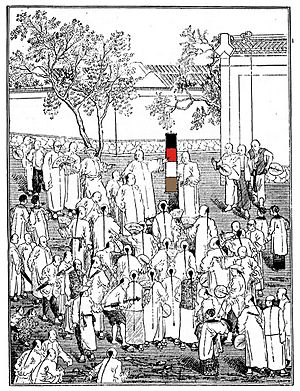
Moody and Ira D. Sankey traveled to Britain together. Moody would speak, and Sankey would sing. They also published books of Christian songs. In 1883, they helped raise money to build a new home for the Carrubbers Christian Centre in Edinburgh.
Moody also greatly helped Christian missions around the world after meeting Hudson Taylor, a missionary to China. He supported the China Inland Mission and encouraged many people to volunteer to serve overseas.
Global Recognition and Final Years
Moody's influence reached people in many countries, even Sweden. Although he was English and never visited Sweden, he became a hero among Swedish Christians. News of his big meetings in Britain spread quickly to Sweden. His speeches were printed in books and newspapers, leading to a "Moody fever" in Sweden from 1875 to 1880.
Dwight Moody gave his last speech on November 16, 1899, in Kansas City, Missouri. He became ill and returned home to Northfield by train. Friends had noticed he had gained a lot of weight. Although doctors never fully diagnosed his illness, it is thought he had heart problems. He passed away on December 26, 1899, surrounded by his family. Reuben Archer Torrey took over as the leader of the Chicago Bible Institute after Moody's death.
Dwight Moody's Books
- Heaven
- Prevailing Prayer—What Hinders it?
- Secret Power
- The Ten Commandments
- A Life for Christ—What a Normal Christian Life Looks Like
- The Way to God and How to Find it
Dwight Moody's Lasting Impact
Dwight L. Moody was a very important person in American religious history. He was described as a "businessman in clerical garb" because he was very organized and energetic. He helped change how religious meetings were done, making them bigger and more organized for cities. His ability to organize large events helped him become famous as the creator of modern mass revivalism.
Ten years after Moody died, the Chicago Avenue Church was renamed the Moody Church to honor him. The Chicago Bible Institute was also renamed the Moody Bible Institute.
During World War II, a ship called the SS Dwight L. Moody was built in his honor.
See also
 In Spanish: Dwight L. Moody para niños
In Spanish: Dwight L. Moody para niños
- William Phillips Hall, a close friend who became a speaker and preacher.
- Horatio Spafford, a friend of Moody who wrote the words to the hymn It Is Well With My Soul.
- Northfield Mount Hermon School


